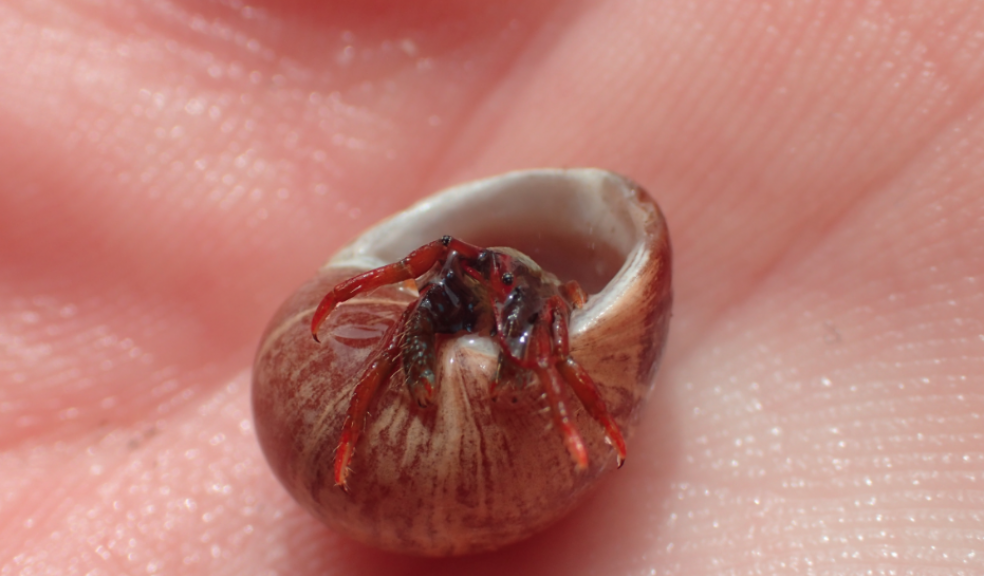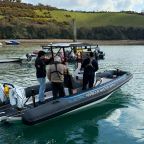
Wildlife Trust welcomes back long-lost crab
A species of crab which had not been seen in Devon for more than 30 years has been found living on a popular stretch of coast close to Plymouth.
The crustacean in question goes by the scientific name Clibanarius erythropus but is more commonly known as the St Piran’s crab. The find was made in Wembury Bay by Devon Wildlife Trust volunteer John Hepburn on one of the many regular rockpool safaris run by the charity from its popular Wembury Marine Centre.
The last record of a St Piran’s crab in Devon was made in 1985. Once common along the southern coastline of the South West it’s thought that the crab, which measures no more than 15mm long, fell victim to pollution resulting from environmental disasters including the wrecking of Torrey Canyon oil tanker in 1967, along with other factors including changing sea temperatures.
Wembury Marine Centre’s rockpool safaris have been running for 25 years bringing a unique insight into marine life along our coasts to thousands of holidaymakers and local people. John Hepburn has been volunteering at the Marine Centre for 13 years helping with hundreds of safaris. However, on this occasion he came across something very special among the seaweed and sand of the Bay’s tidal rockpools.
St Piran’s crab is a type of hermit crab which uses the empty shells of other molluscs to make a home. Spotting what he thought was a relatively common find in the shape of a ‘netted dog whelk’ shell, John made his amazing discovery. He said: “Picking up the shell I realised it was not empty. What I assumed was a hermit crab was more confident than usual and came out a long way to examine the end of my finger. Being colour-blind I asked the family I was showing around the rockpools if the crab was red, and having been told it was reddish, I thought it worthwhile trying to get a picture in case it was a St Piran’s crab.”
Once back home John examined his picture, comparing it with on-line videos of St Piran’s crabs. His find matched the videos, a fact confirmed later by the Marine Biological Association of the UK.
This Devon discovery of a St Piran’s crab follows its re-discovery in March in Cornwall, close to Falmouth. The Cornish find was the first in the UK since the 1980s and generated widespread media attention. Viewers of BBC’s Spring Watch programme were asked to give the crustacean a ‘common’ name which up until that point had only been known as Clibanarius erythropus. St Piran, the patron Saint of Cornwall, was the popular response.
Now St Piran’s crabs have also been found alive and well living in Devon and their proud discoverer John Hepburn said: “This is a pretty special find. There were lots of other people hoping to be the one to discover the first St Piran’s crab outside Cornwall. That it’s now making a comeback after being absent from our shores for so long shows that it is always worth making the effort to save our seas.”
Coral Smith, Marine Education Officer at Devon Wildlife Trust said: “John’s discovery came during one of our regular rockpool safaris. It just goes to show that our local marine wildlife still has the capacity to surprise and how important places like Wembury are, it’s why it holds one of the highest forms of statutory protection as a Special Area of Conservation. We’re honoured that Devon’s first St Piran’s crabs have been found here - they are certainly very welcome back!”
The answer to the question of how these small crabs may have re-established themselves in the South West after an absence of decades remains something of a mystery. However some marine biologists think the new populations of St Piran’s crabs may have been carried across the seas as plankton from existing populations on the west coast of France.
Wembury Marine Centre’s rockpool safaris continue through summer into the autumn. For more details visit www.wemburymarinecentre.org














